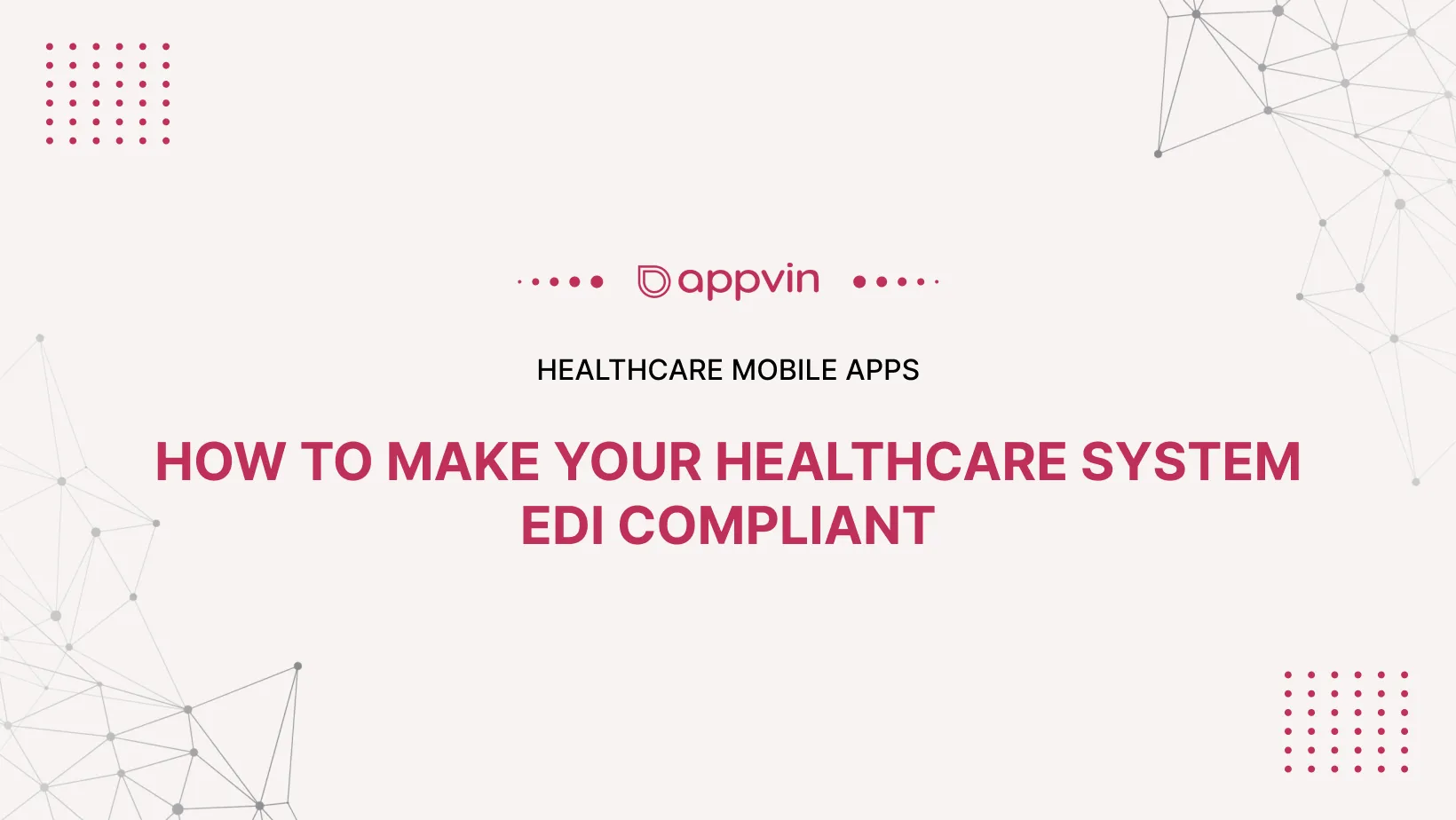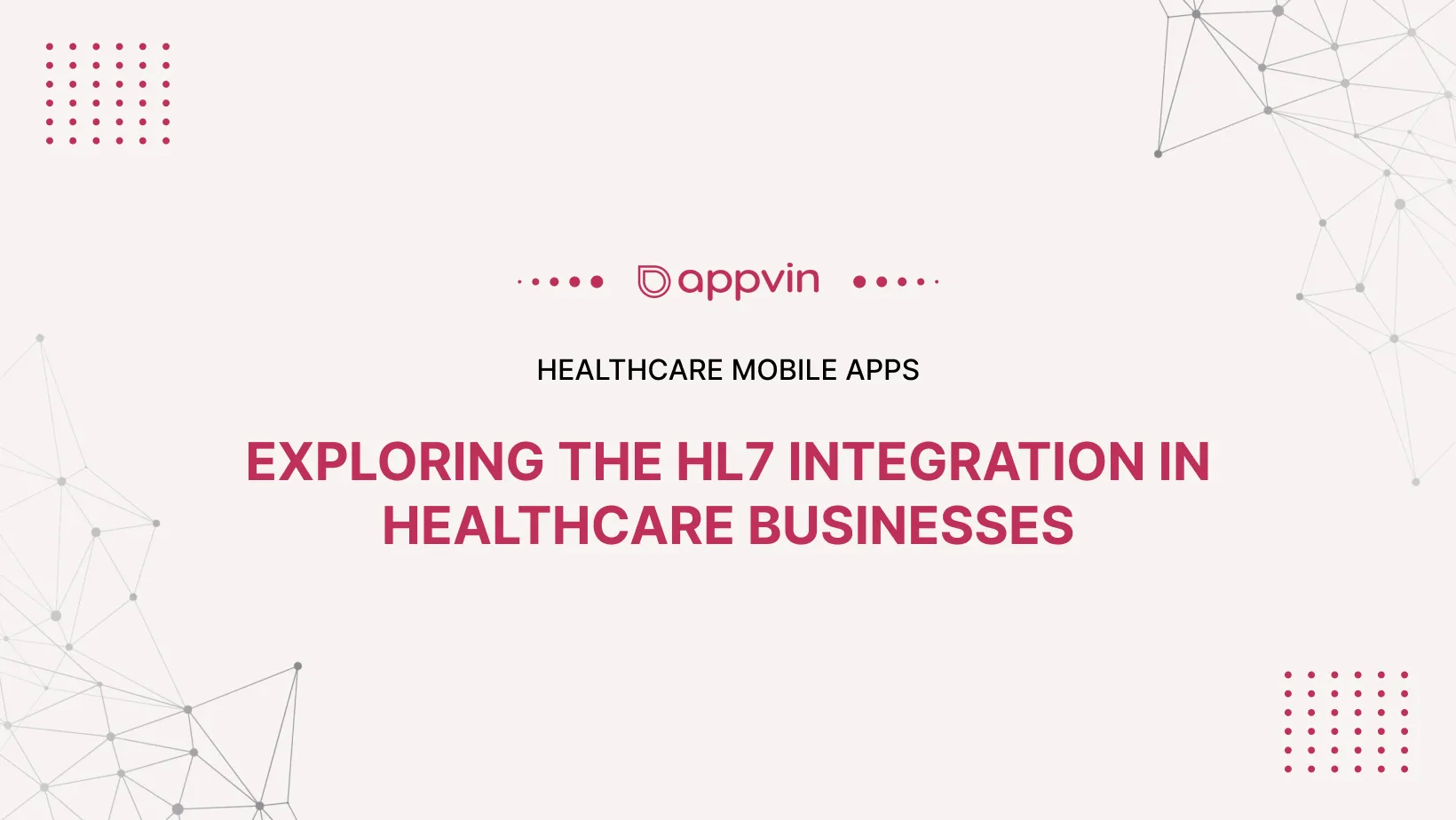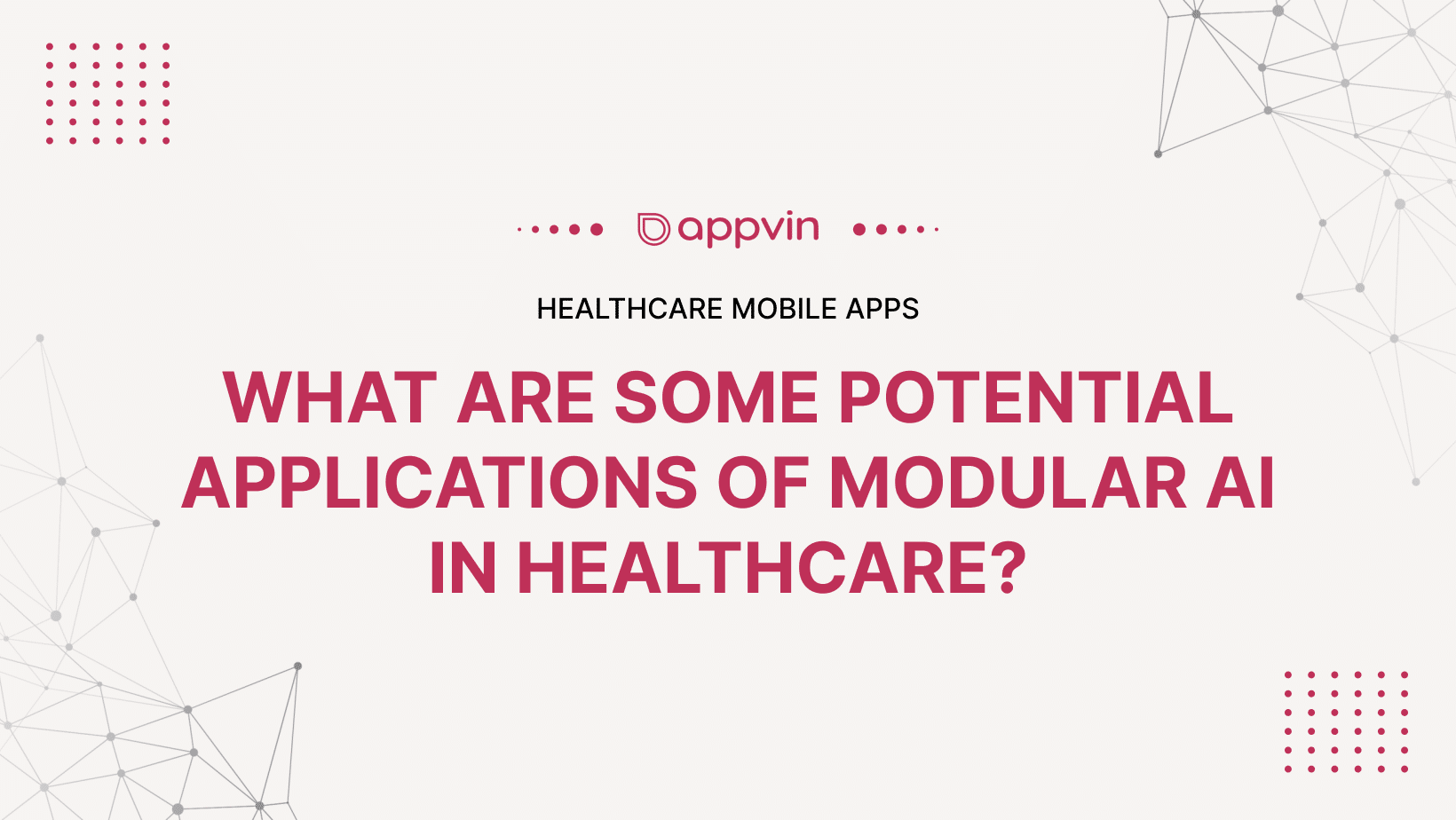Healthcare technology is the medical sector that includes medical devices such as artificial intelligence, microcomputing, blockchain, IT systems, and various IT algorithms, these are designed to support the healthcare system.
It includes the use of various technologies to improve the delivery of medical care, enhance patient needs, and the overall performance of the healthcare system.
The primary goal of healthy technology is to enhance the healthcare system, reduce healthcare costs, improve the delivery of medical care, and promote overall public health.
Over the past few years, the use of information technologies (IT) in the Healthcare system has multiplied, including the significant growth of healthcare mobile app development services.
In this post, we will discuss technologies used in the healthcare sector from the beginning to the end. First of all, we will discuss the various technologies used in healthcare. Then, we will be concerned about the main advantages of healthcare technology. Finally, we will discuss some key points related to healthcare technology.
Healthcare Technology
Healthcare technology is known for improving and professionalizing services by using technological tools and innovations in healthcare.
Through the use of technologies in healthcare, the quality of effectiveness of services are enhanced. The use of incorporating technological tools in the health sector and the use of software, digital sensing, robotics, and data analysis, help to invent and develop new technology in the field of health.
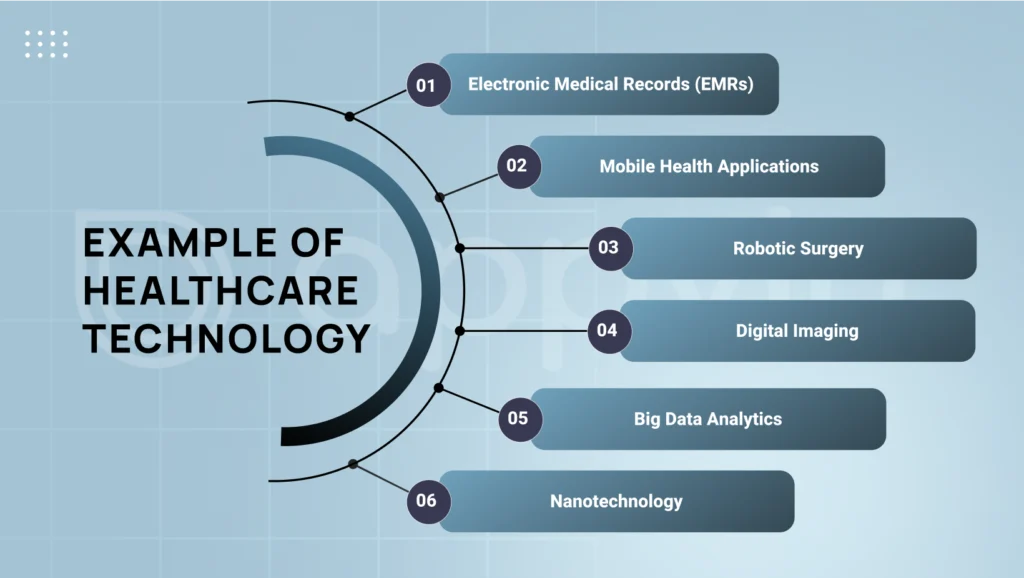
Example of Healthcare Technology
Healthcare technologies such as electronic medical records, digital imaging, healthcare mobile app development, development in robotic surgery, big data analytics, and nanotechnology improve diagnosis, treatment, and patient outcomes with better equipment and technology. However, here we’ll discuss a few examples of healthcare technology.
Electronic Medical Records (EMRs):
Electronic Medical(EMRs) are used to store health information in digital form to make it easier to view and share patient data and retain data for a long time.
Digital Imaging:
The Digital Imaging techniques help to diagnose the patient’s disease faster as this technical process uses roentgen, scans, or other imaging techniques. This helps to create pictures of the patient body, which helps the doctors to better diagnose the patient’s disease.
Mobile Health Applications:
These applications provide health-related information on the smartphones of the user. Applications provide the services, and treatments to the user and help users get health care from their mobile phones, so every user helps in getting their first aid as fast as possible.
Robotic Surgery:
Robotic Surgery makes the surgery process easy as it uses robotic types of equipment. That facilitates the process of surgery and increases precision. This process makes treatment even easier in the future.
Big Data Analytics:
It uses large collections of data to identify patterns, trends, and forecasts related to health and disease, which also makes the process of discovering new medicines easy. This data is from many patients and is used to analyze the disease.
Nanotechnology:
It is known for its innovation, by the use of technological tools for disease diagnosis and treatment at the nano level. This is similar to there being neurocoeles in our brain. It is used to perform sensitive tasks in healthcare. Nanotechnology is used in many areas as Cancer detection and treatment and drug delivery, regenerative medicine, and many more.
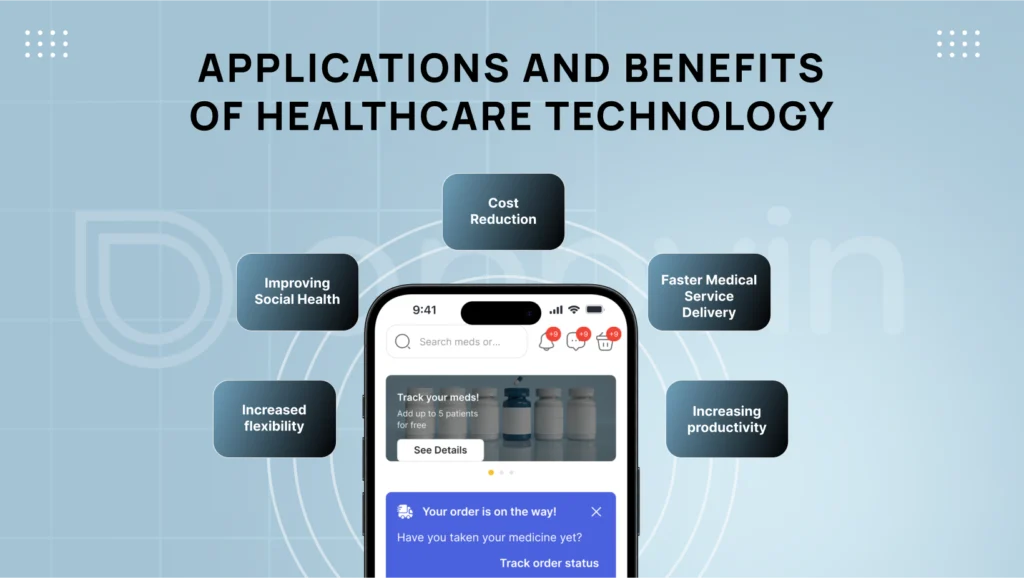
Applications and Benefits of Healthcare Technology
Healthcare technology is used to strengthen health transmission, as it enhances the quality of medical care and fast computation. It also helps to improve societal health. It uses various technologies and tools such as Artificial Intelligence (AI), cloud computing, blockchain, IT systems, and various IT algorithms.
Provide smart hospital management:
The technologies in healthcare improve the efficiency and effectiveness of the overall system. It improves the patient experience by using digital and advanced equipment & systems in healthcare.
Cost Reduction:
Healthcare technology is used to reduce expenditure, which leads to a reduction in the cost of health and better utilization of resources.
Less medical errors: With the use of healthcare technology the chance of getting errors is very low. It helps to provide more accurate patient data and provide the best treatment results.
Faster Medical Service Delivery:
Using innovative technologies helps healthcare providers to provide more quality service. For achieving better outcomes for patients and also enhancing the level of medical care these technologies were useful.
Increasing productivity:
The use of healthcare technologies’ productivity and efficiency is growing as these technologies reduce time. For ex., if any healthcare provider system uses an automated machine for the appointment scheduling of a patient this technology faster the scheduling time as the number of appointments increases, thus resulting in the productivity of the system.
Improving Social Health:
The main objective of healthcare technology is to improve social health. It ensures early detection of disease, preventive treatment, and good health governance.
Increased flexibility:
Many mobile applications help to diagnose the disease from our mobile which provides flexibility to the user and provides first aid as fast as possible.
By implementing these technologies into the healthcare system, we work towards a more empowered and effective healthcare system for both health providers and patients. This made a positive impact on the medical system.
Impact of Technology on the Healthcare System
Technology has brought various changes in the healthcare field. It implements various methods regarding patient care, administration, research, and communication.
The following are the impacts in which technology has transformed the healthcare sector:
Provide maximum Efficiency:
Electronic health records (EHRs) ensure patient data management, reducing paperwork and making patient information available to healthcare providers quickly. It also ensures the security of the data sharing.
This provides the ability to make diagnoses in a more timely manner, allowing the highest level of care to be provided.
Faster digital treatment service:
Nowadays many healthcare providers are providing treatment services on digital platforms. It allows patients to get treatment at the convenience of their home and also without visiting a hospital or clinic.
Virtual connectivity and communication:
With the use of digital communication platforms, patients and doctors can conduct remote visits, seek advice, and share medical reports, which reduces time and expense, allowing major decisions to be taken quickly.
Research and innovation with technology:
Research and innovation with technology are increasing for the highest level of technological utility, leading to the development of new and more effective treatment methods.
Disease prediction and countermeasures:
Using data analysis and algorithms, the scientific community is developing countermeasures to predict and control disease outbreaks.
With all these changes, technology has strengthened and taken healthcare to the highest level, benefiting both the patient and the doctor.
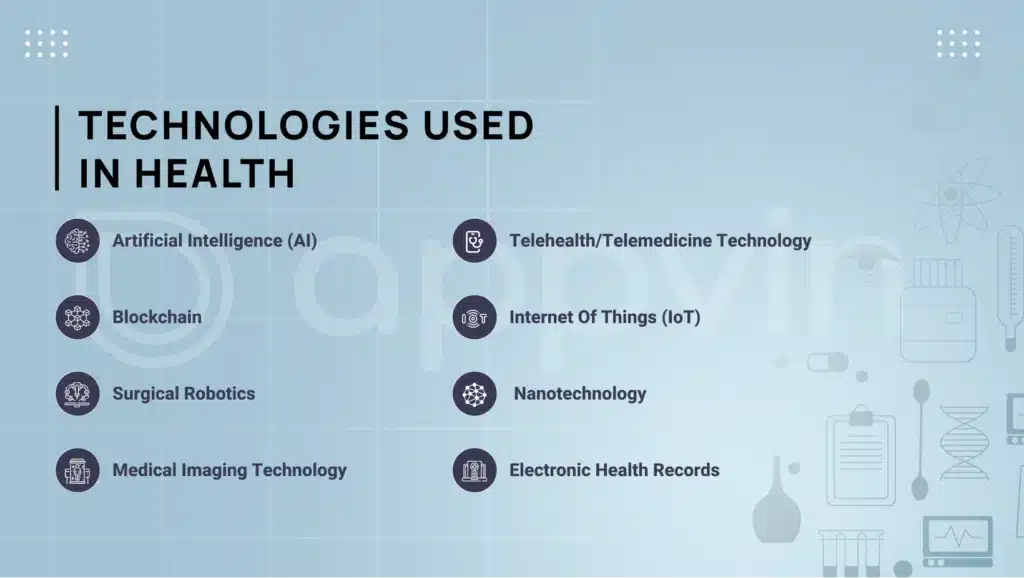
Technologies used in health
Artificial Intelligence (AI):
AI is known for its accuracy and capability of doing any task fast. It helps in diagnosing diseases, formulating treatment plans, and making the best use of medical resources in health services. Hence, Artificial Intelligence (AI) is transforming healthcare by supporting medical decision making, enhancing patient care, and promoting research. In healthcare settings, AI may include the use of machine learning, natural language processing, or computer vision. These artificial intelligence-derived instruments mine large datasets to scrutinize and characterize conditions/progress, as well as to tailor interventions. When it comes to diagnosing of diseases, aiding in operations, and other medical procedures, AI is revolutionizing the future of healthcare.
Blockchain:
Blockchain ensures the health contexts to keep data more secure and confidential. It allows to sharing of data, which increases the quality and effectiveness of health services. It provides transparency in data and traces the authenticity. The following are the advantages of using Blockchain.
-> Ledger – Ledger refers to a record of transactions over time while still allowing for tracking and analysis. It documents the
transfer of ownership and is ultimately a means for proving ownership.
-> Block – A block is a unit of data (or record) that holds a collection of transactions which, together with
many other blocks arranged in a specific order, form a blockchain.
-> Hash – Digital equivalent of a fingerprint; unique and useful for detecting change in a file. This is one component that makes the blockchain secure.
Surgical robotics:
Many Healthcare systems perform surgeries with robotic assistance. It ensures safety, precision, and detail, and reduces time and measures.
Telehealth/Telemedicine technology :
It providers use telehealth to their patients during the pandemic. With the help of digital technology, providers could virtually treat patients over video calls. Provides treatment, consultation, and monitoring of the patient through digital means, which saves time and resources.
Internet of Things (IoT):
IOT devices transform the healthcare system into a faster, smarter, and more accurate. Connecting devices and appliances through the Internet enables better and more structured data communication, which improves health services. It improves patient experience and overall outcome.
Nanotechnology:
Useful in developing medical devices and treatments on a smaller scale, which increases the efficacy of treatments. The technology involving the building, characterization, and manipulation of materials at the atomic and molecular level is called Nanotechnology and has aroused great interest in health care. Nanotechnology functioning on the nanoscale provides opportunities for more effective diagnostics, treatment, and prevention of diseases to remain in medicine.
Medical imaging technology :
Used to diagnose diseases and monitor medical conditions, such as X-rays, scans, and MRIs. Diagnostic imaging technology is important in medicine and managing medical conditions. Imaging methods like X-ray, CT, MRI offer clear pictures of internal organs and thus have a high chance of accurate diagnosis and planning of treatment. These imaging techniques are important equipment in diagnosing diseases and evaluating the expenditures of diseases in addition to being applied in surgeries.
Electronic Health Records:
Digitally stored medical data is important for patient monitoring, treatment management, and research. Electronic Health Record (EHR) is a digital database of patients’ information which helps track a disease’s progress, provide treatment plans and conduct clinical investigations. EHRs enable the access of complete patient details by the practitioners, and this reduces the disruption of patient care. Also, it enables data for research use as well as medical enhancements and progression to better patient care plans.
Challenges & Considerations
Despite the numerous benefits, the implementation of healthcare IT is not without challenges. There are concerns with initial installation costs, recurring expenses, and the requirement for undergoing training for the personnel of the health department.
$nsbp;
Furthermore, the problem of linked application and platform integration and data privacy concerns may limit popular usage. Solving these problems requires a long-term plan, reliable investments in the IT field, and constant development. The following are various challenges and considerations in the use of technology in healthcare.
Privacy & Security:
The first challenge is privacy and security. Privacy and security are extremely important to take special precautions regarding the security and privacy of digital health data. Personal health information falling into the wrong hands or having unauthorized use can lead to data breaches and privacy issues.
Lack of Technical Skills:
The second challenge is related to technology inability. Lack of technical skills and high-quality health services can hamper access to health services, especially in poor and unfamiliar areas. The solution may be to collaborate technical resources with community organizations and government bodies.
Lack of good infrastructure:
Investing in the development of health resources can address this challenge, achieving the highest quality and accessible health services. Active technological advancement in healthcare services is essential.
Conclusion
The term healthcare technology refers to any IT tools or software designed to boost hospital and administrative productivity, give new insights into medicines and treatments, or improve the overall quality of healthcare provided. AppVin Technologies develops innovative modular healthcare app development services solutions specifically for this technology applications. With its front-line AI platform and expertise, AppVin is at the forefront of driving the adoption of modular AI in the this industry. Their technologies have the potential to enhance patient outcomes by providing more accurate diagnoses, personalized treatment plans, and efficient disease management.
FAQs
Why is healthcare IT important?
Healthcare IT plays a crucial role in improving patient care, streamlining operations, enhancing communication among healthcare providers, and ensuring the security and privacy of patient data.
How does healthcare IT benefit patients?
Healthcare IT enables patients to access their medical records online, schedule appointments conveniently, communicate with healthcare providers remotely, and receive personalized treatment recommendations based on their health data.
What are the benefits of electronic health records (EHRs)?
EHRs improve the accuracy and accessibility of patient information, reduce medical errors, facilitate communication among healthcare providers, and support evidence-based decision-making.
How does healthcare IT improve healthcare delivery?
Healthcare IT systems such as telemedicine platforms, remote patient monitoring devices, and health information exchanges enable healthcare providers to deliver care more efficiently, particularly in underserved or remote areas.
What are the challenges of implementing healthcare IT?
Challenges include interoperability issues between different IT systems, ensuring data security and privacy, addressing staff resistance to change, and managing the costs of implementation and maintenance.
How can healthcare IT improve population health management?
Healthcare IT enables population health management by analyzing large datasets to identify trends and patterns, monitoring the health status of specific populations, and implementing targeted interventions to improve health outcomes.


